| ■Studied
at H. J. Cambie Secondary School, Canada
|
|
 |
No border any more!
What
kind of impression or image do you have in mind when you hear the name
of the place, "Vancouver, Canada"? You might imagine that there
are many Canadians of European decent, and most of the cities are surrounded
by vast nature and forests. However, my stereotype of Canada has changed
through my experiences while studying there.
I studied in Vancouver for ten months as an exchange student from Ikuei
Gakuen High School. I was shocked that there were so many immigrants from
so many different countries, such as China, the Philippines, Russia, and
India. This was similar to my school, which was called Cambie High School.
My friends there were from many different backgrounds.
Cambie High School especially had many Chinese people. My host family
was also Chinese, so I had the chance to learn Chinese as well as improve
my English. I also took a Chinese language class at Cambie. My Chinese
friends were so friendly and helpful with my studies, and therefore I
was able to improve my Chinese skills.
As you might imagine, Japan is a popular country to the people of Canada.
So there are Japanese restaurants, food stores, a book store, and even
a Japanese convenient photo machine. These places clashed with my stereotype
of Canada and really impressed me. Many Chinese people had knowledge and
an interest in Japan as well. So it was always a good topic of conversation
and a good opportunity to recognize and learn about each other's culture.
One of the best opportunities to form great friendships was at camp,
bowling and skating in P.E. class! I made friends with people with no
regard to racial or ethnic background. I think this happened because we
shared in positive activities together.
Have any of my stories about my experiences broken your stereotype of
Canada? It was great to be able to learn about foreign languages, culture,
and customs firsthand; especially English and Chinese. And at the same
time, my friends were able to spread and expand their own knowledge about
Japanese culture and language. The "boundary" between me and
the other countries had fallen during my great opportunities I experienced
in Vancouver. The "boundary" I used to imagine between Japanese
people and people of other countries was not even there! My own "boundary"
disappeared completely.
So if you are wondering whether or not you should study abroad, I strongly
suggest you should. There might be things that you don't expect, but you
will overcome these obstacles and come to realize that you learn from
them. The challenges are an important part of the brilliant experience
of living and studying abroad. You will come to see things in a different
light, unlike you had before. This might change the course and widen the
road of your future path. I guarantee you will be successful once you
decide to be! Any "boundaries" you may have, like I had, will
surely disappear.
|
Erika Honda
Grade 12,
Foreign Language Course
Graduate at Koyo Jr. High
Studied at H. J. Cambie Secondary School, Canada
From September 2004 through June 2005
Entered Ritsumeikan
University |
| |
| |
 |
| |
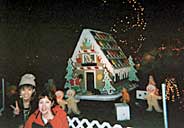 |
| |
 |
| |
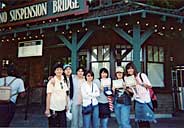 |
| |
| |
| ■Studied
at Ullvi Gymnasiest High School, Sweden
|
|
 |
I'll never forget
my time in Sweden.
Last
year I studied for 10 months in Koping. Koping is a very small town, but
people were so kind and I could also enjoy a lot of nature there.
Swedish is the official language of Sweden. When I went to Sweden, I
couldn't speak Swedish very much. So I had to go to a language school
for foreigners, Komvix. At the school, the teachers taught Swedish in
Swedish! I was very surprised and confused. In the beginning, it was very
hard for me to understand what the teacher was saying. But day by day,
little by little, I got to understand, and felt very delighted.
I also attended the Ullvi Gymnasiet,
which is a public high school, and I chose the media program. Because
I was going to both Ullvi and Komvix, I could atted only a few Ullvi's
classes. But what I felt through the class was that the students and their
teachers were very close. It was a big difference to school in Japan.
Students also have many opportunities. For example, they have no uniforms
and less school rules, they could wear whatever they want and change hair
colors. But it means that they need to control themselves and be independent
even when they are young. Teachers don't say メstudy more!!モ So, if you
study hard by yourself.
In the family in Sweden, commonly, both parents work. I stayed with
two Swedish families, and both of them were two-income families. They
are busy but they are used to having a cup of tea together and try to
have conversations with other family members. They like having tea with
their family and friends. And in Swedish there is a word for having tea,
"fika". I love this word.
During my stay in Sweden, I talked a lot with my host families, their
friends, and my classmates in Komvix and Ullvi Gymnasiet. After the New
Year, I could chat in Swedish with them, but they were also good at English
too. A 12-year-old boy could have easy conversations in English. I think
one of the reasons is TV. In Sweden they import many English or American
TV programs.
But I was most surprised how little they know about Asia. Most of them
had been thinking that people in Japan speak Chinese! This was shocking
to me. I thought Japan was a famous country all over the world, but they
only know the name of it. They didn't know much about the culture or the
people of Japan. On the other side of things, it was very interesting
to learn about another country and culture. As I learn about another country
and culture. As I learned about Sweden more, I realized that in Japan
there were lots of things, which I didn't know. Now I'm going to university
and studying Japanese and other cultures of the world. It helped me see
Japan and the rest of the world in a new light. I'll never forget my time
in Sweden.
|
Satomi Okuyama
Grade 12,
Foreign Language Course
Graduated from a Jr. High attached to Yamagata University
Studied at Ullvi Gymnasiet, Sweden
From September 2004 through June 2005
Entered Kansai Gaidai University |
| |
| |
| |
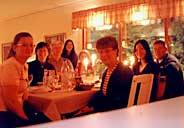 |
| |
| |
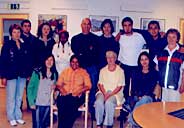 |
| Classmates of Komvix |
| |
 |
| at Christmas |
| |
 |
| Graduation at
Ullvi |
| |
|
| ■Studied
at Ullvi Gymnasiest High School, Sweden
|
|
 |
I could communicate
with many people
through playing table tennis.
I
was in Sweden to study language and to play
table tennis for 9 months. The reason why I chose Sweden to study abroad
was I had visited there when I was 13 years old. I had enjoyed staing there.
So, I decided to go Sweden where there are many kind people and beautiful
sights.
I studied Swedish everyday in Sweden. Sweden is a country that accepts
a number of immigrants from all over the world and 10% of the population
is not pure Swedish. I studied Swedish at a community school called Komvux,
which is for immigrants learning Swedish. The school taught us not only
Swedish but also culture and politics. I also went to Ullvi high school
and took the music program with Swedish students. I studied English and
music there.
One of my reasons for going to Sweden was to play table tennis. I practiced
table tennis from Monday to Friday, and on weekends I played in the North
Swedish Series and sometimes in competitions. I could communicate with many
kinds of people from different countries through playing table tennis.
For example; China, Brazil, Australia, Ukraine, Latvia, Lithuania, and
Scotland.
It was quite a good experience learning about different cultures and values.
I think I became a more positive and active person. In addition, I found
my new purpose for the future. I decided to be an English teacher because
I realized that learning a foreign language is really fun. So if I become
an English teacher, I will motivate my students to study English. Lastly,
I would like to tell someone who wants to study abroad that they may find
what they really want to do in the future while they are there! |
Nagisa Nishida
Grade 12,
Shukoh Middle School
Graduate at Oya Jr. High
Studied at Ullvi Gymnasiet,
Sweden
From September 2004 through June 2005
Entered Waseda
University |
| |
| |
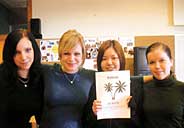 |
| |
 |
| |
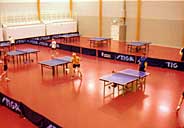 |
| |
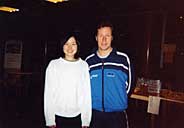 |
| |
|
 |
|














